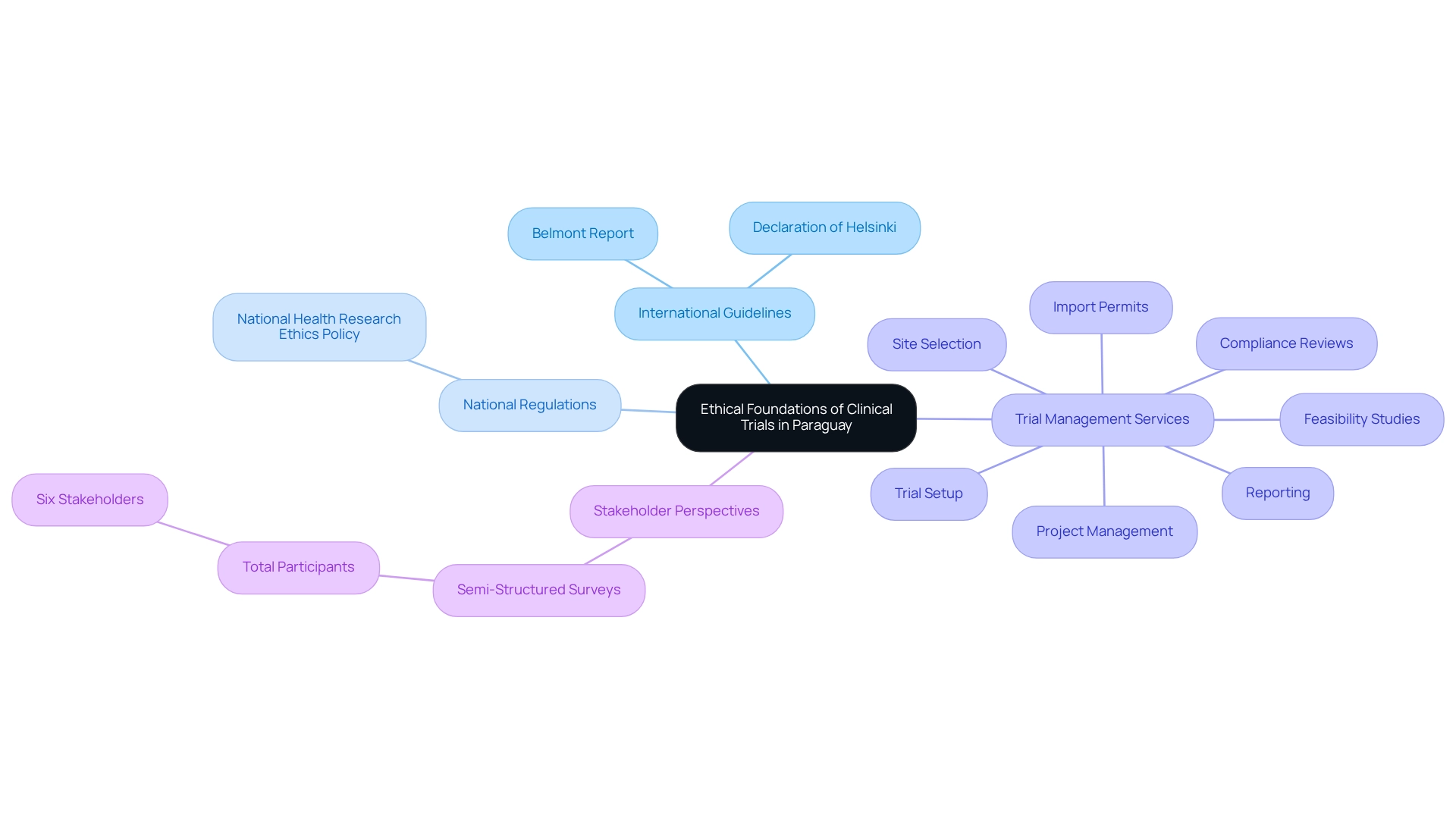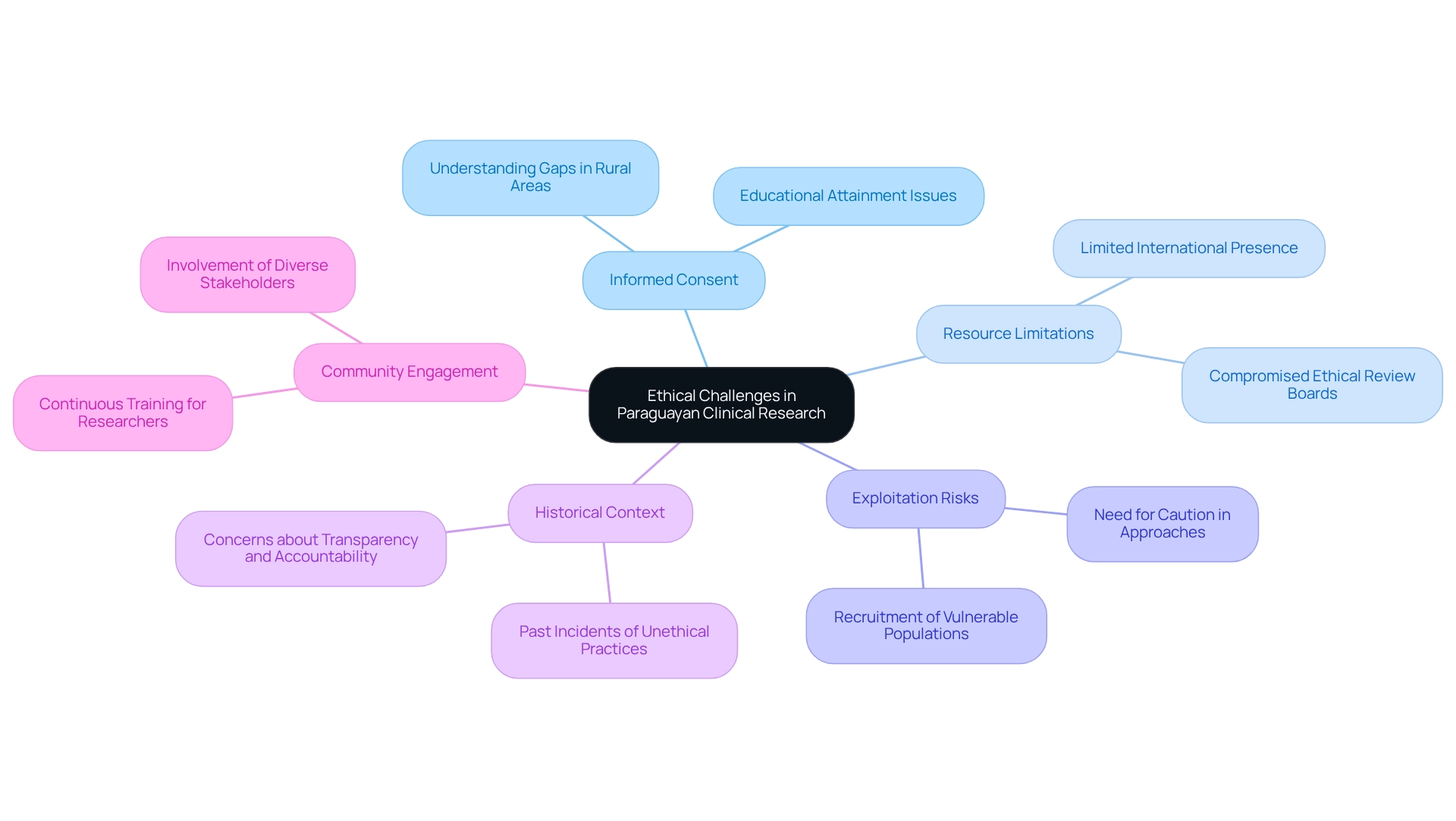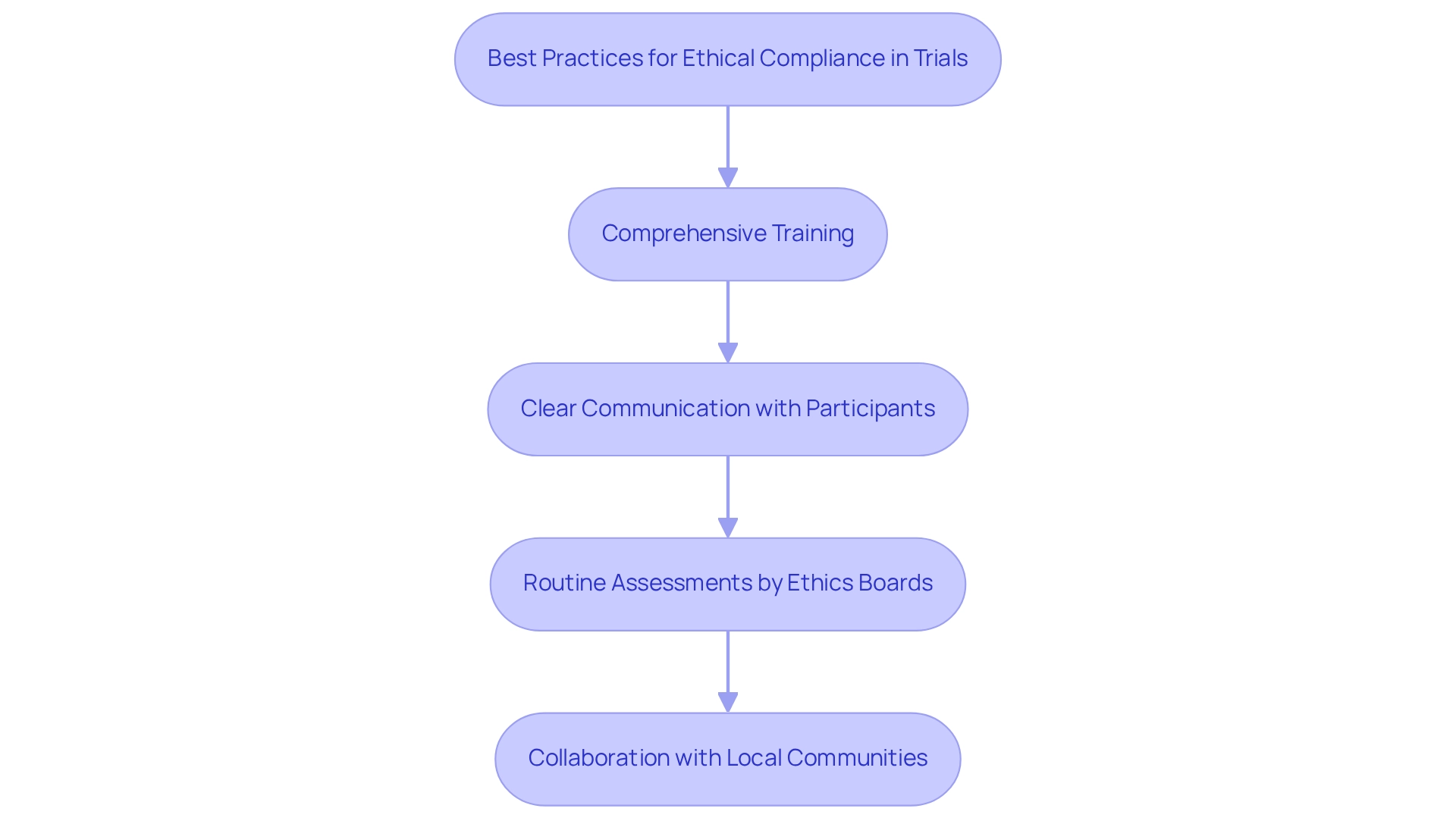Overview
The article addresses the ethical considerations critical to clinical trials in Paraguay, underscoring the imperative for adherence to international guidelines, informed consent, and the safeguarding of vulnerable populations. It elucidates challenges such as the inconsistent understanding of informed consent and the scarcity of resources for ethical review boards. Furthermore, it advocates for best practices, including:
- Comprehensive training
- Active stakeholder engagement
to bolster ethical compliance and ensure the safety of participants.
Introduction
In Paraguay, the landscape of clinical trials is shaped by a complex interplay of ethical standards, regulatory frameworks, and cultural nuances. Anchored in international guidelines and bolstered by national policies, the ethical foundations of medical research emphasize respect for participants, beneficence, and justice.
However, the realities of conducting clinical research reveal significant challenges, including:
- Inconsistent understanding of informed consent among participants
- Resource constraints that hinder ethical oversight
As the demand for ethical compliance intensifies, best practices emerge as critical tools for researchers aiming to navigate this intricate environment. Engaging stakeholders and fostering transparency not only enhance the integrity of clinical trials but also empower communities, ensuring that research is relevant and ethically sound.
This article delves into the ethical foundations, challenges, and best practices that define clinical trials in Paraguay, highlighting the importance of continuous improvement and community involvement in advancing ethical research.
Explore Ethical Foundations of Clinical Trials in Paraguay
In Paraguay, ethical considerations for Paraguayan trials are firmly rooted in both international guidelines and national regulations. The Declaration of Helsinki and the Belmont Report delineate essential moral tenets for medical studies involving human participants, such as respect for individuals, beneficence, and justice. Additionally, Paraguay has instituted a National Health Research Ethics Policy that addresses ethical considerations for Paraguayan trials and establishes a governance framework for health-related ethics. This policy underscores the critical importance of informed consent, the protection of vulnerable groups, and the necessity for review boards to oversee research protocols, highlighting the ethical considerations for Paraguayan trials.
Moreover, extensive trial management services, such as those provided by bioaccess, are indispensable in ensuring adherence to these moral standards. These services encompass:
- Feasibility studies
- Site selection
- Compliance reviews
- Trial setup
- Import permits
- Project management
- Reporting
All of which are crucial for maintaining the integrity of clinical studies. A systematic review of oncology trials in Latin America revealed that 66.6% of the analyzed research reported incomplete adverse event attribution, highlighting the urgent need for strict compliance with established guidelines. This finding aligns with insights from a case analysis titled "Challenges and Opportunities for Oncology Clinical Trials in Latin America," which emphasizes the importance of accurate adverse event reporting in upholding moral standards.
Furthermore, a total of six stakeholders participated in semi-structured surveys, providing valuable perspectives on the moral dilemmas faced in healthcare studies. The ongoing reassessment of regulations is vital to enhance participant safety and ensure compliance with ethical guidelines, emphasizing the ethical considerations for Paraguayan trials and reinforcing the significance of maintaining the integrity of research studies in Paraguay.

Identify Ethical Challenges in Paraguayan Clinical Research
Despite the presence of established moral guidelines, ethical considerations for Paraguayan trials face significant obstacles. A primary concern is the inconsistent understanding of informed consent among participants, particularly in rural areas where educational attainment is often lower, highlighting the ethical considerations for Paraguayan trials. This gap in understanding ethical considerations for Paraguayan trials can hinder informed decision-making, leading to moral dilemmas.
Furthermore, with only one international pharmaceutical firm operating in Paraguay, the medical study environment is limited, intensifying resource constraints for ethical supervision. The recruitment of vulnerable populations carries risks of exploitation if not approached with caution, emphasizing the ethical considerations for Paraguayan trials.
Ethical considerations for Paraguayan trials often lead to ethical review boards encountering resource limitations, which can compromise their ability to conduct thorough evaluations of research proposals. The historical context of corruption in medical trials in the region, underscored by past incidents of unethical practices, raises significant concerns about ethical considerations for Paraguayan trials, particularly regarding transparency and accountability.
As Ali Cundari aptly states, "With careful planning and execution, the rewards of this journey are well worth the effort." To effectively address these challenges, it is crucial to establish continuous training for researchers and develop robust community engagement strategies that promote adherence to standards and foster trust within the communities involved, taking into account the ethical considerations for Paraguayan trials.
Moreover, involving a diverse array of stakeholders in discussions about ethical considerations for Paraguayan trials can facilitate a more comprehensive evaluation and enhance the overall integrity of research in Paraguay.

Implement Best Practices for Ethical Compliance in Trials
To ensure moral compliance in clinical trials, researchers in Paraguay must integrate ethical considerations for Paraguayan trials and adopt several best practices. First, comprehensive training sessions on moral standards are crucial for all team members. This training should encompass:
- Informed consent procedures
- The significance of participant confidentiality
- The appropriate treatment of vulnerable groups
A case analysis titled 'Evaluation of Ethics Training Effectiveness' assessed the impact of an ethics training program, highlighting that such initiatives significantly enhance awareness among investigators and underscoring the need for continuous improvement in training methodologies.
Moreover, establishing clear communication pathways with participants is vital for fostering transparency and trust. Researchers ought to furnish detailed information about the research, including potential risks and benefits, thereby empowering participants in their decision-making processes. This approach aligns with the views of moral specialists, such as Jasper Knight, who asserts that engagement with moral issues leads to enhanced inquiry practices and outcomes.
Furthermore, routine assessments and evaluations of inquiry protocols by independent ethics boards are essential for identifying and addressing moral concerns early in the inquiry process. Such oversight can mitigate risks associated with participant confidentiality, particularly in studies involving biometric technology, which presents significant privacy challenges and necessitates careful management of biometric data.
Ultimately, forging collaborations with local communities can enhance participant recruitment and retention while ensuring that practices are culturally sensitive and ethically sound. By integrating these optimal strategies, investigators can effectively navigate the moral landscape of trials in Paraguay, taking into account the ethical considerations for Paraguayan trials, which ultimately results in more rewarding and principled interactions with study participants.

Engage Stakeholders and Ensure Transparency in Research
Involving stakeholders—patients, healthcare providers, and community leaders—is essential for ensuring ethical considerations for Paraguayan trials in clinical studies. Researchers must actively engage these groups during both the planning and implementation phases of trials, ensuring that the research aligns with pertinent health issues and respects community values. Clarity is crucial in this process; researchers must openly communicate research objectives, methodologies, and outcomes to stakeholders. This can be effectively achieved through community meetings, informational brochures, and dedicated online platforms.
Notably, a research evaluation of stakeholder engagement outcomes demonstrated that pre-defining the rationale for engagement enables teams to assess whether their efforts achieved desired objectives, such as enhancing stakeholders' sense of autonomy and involvement. This case analysis underscores the importance of customizing engagement strategies to the local context, ensuring that community members' voices are acknowledged and appreciated.
By fostering an inclusive environment where stakeholders feel valued and informed, researchers can significantly enhance ethical considerations for Paraguayan trials, ultimately improving participant recruitment and retention. Significantly, statistics indicate that two-thirds of current research in the region actively includes patient involvement, highlighting the growing recognition of its importance in clinical trials. As one partner remarked, 'This research has opened my eyes personally to how significant my contribution is.' I was previously unaware of the value of a patient’s perspective in research until I became engaged with this project.
Optimal approaches to stakeholder involvement not only elevate the moral standards of studies but also facilitate more efficient and relevant health interventions. Furthermore, ethical approval for studies like 'Stakeholder Engagement in EQUIPT for Impact (SEE-IMPACT)' highlights the ethical considerations for Paraguayan trials and reinforces the commitment to ethical research practices in the region.

Conclusion
The ethical landscape of clinical trials in Paraguay is multifaceted, shaped by international guidelines, national policies, and the unique cultural context of the country. Significant strides have been made in establishing ethical frameworks; however, challenges such as inconsistent understanding of informed consent and resource limitations continue to pose risks to the integrity of research. The emphasis on informed consent, protection of vulnerable populations, and the role of ethical review boards are critical in navigating these complexities.
Best practices—including comprehensive training for researchers, fostering open communication with participants, and conducting regular audits—are essential for enhancing ethical compliance. Engaging stakeholders—patients, healthcare providers, and community leaders—ensures that research is relevant and respects community values, ultimately improving participant recruitment and retention. The growing trend of incorporating patient involvement in studies reflects a broader recognition of the importance of ethical standards in clinical research.
In conclusion, advancing ethical clinical trials in Paraguay requires a commitment to continuous improvement, community engagement, and adherence to established guidelines. By addressing the existing challenges and implementing best practices, researchers can contribute to a more ethical and effective clinical research environment that benefits both participants and the wider community. As the landscape of clinical trials evolves, the focus on ethical integrity will remain paramount in fostering trust and ensuring the success of medical research in Paraguay.
Frequently Asked Questions
What are the key ethical guidelines governing medical studies in Paraguay?
The key ethical guidelines governing medical studies in Paraguay are the Declaration of Helsinki and the Belmont Report, which emphasize respect for individuals, beneficence, and justice.
What national policy addresses ethical considerations for trials in Paraguay?
Paraguay has instituted a National Health Research Ethics Policy that addresses ethical considerations for trials and establishes a governance framework for health-related ethics.
What is the importance of informed consent in Paraguayan trials?
Informed consent is critical in Paraguayan trials as it ensures that participants are fully aware of the research and its implications, thereby protecting their rights and autonomy.
What role do review boards play in the ethical oversight of research in Paraguay?
Review boards are necessary for overseeing research protocols, ensuring that ethical standards are upheld throughout the research process.
What services do trial management companies provide to ensure ethical compliance?
Trial management companies, such as bioaccess, provide services including feasibility studies, site selection, compliance reviews, trial setup, import permits, project management, and reporting to ensure adherence to ethical standards.
What does the systematic review of oncology trials in Latin America reveal about ethical compliance?
The systematic review revealed that 66.6% of the analyzed oncology trials reported incomplete adverse event attribution, highlighting the urgent need for strict compliance with established ethical guidelines.
How do stakeholders contribute to understanding ethical dilemmas in healthcare studies?
Six stakeholders participated in semi-structured surveys, providing valuable perspectives on the moral dilemmas faced in healthcare studies, which aids in understanding and addressing these issues.
Why is the ongoing reassessment of regulations important in Paraguay?
The ongoing reassessment of regulations is vital to enhance participant safety and ensure compliance with ethical guidelines, reinforcing the integrity of research studies in Paraguay.




